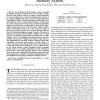Free Online Productivity Tools
i2Speak
i2Symbol
i2OCR
iTex2Img
iWeb2Print
iWeb2Shot
i2Type
iPdf2Split
iPdf2Merge
i2Bopomofo
i2Arabic
i2Style
i2Image
i2PDF
iLatex2Rtf
Sci2ools
141
click to vote
TVLSI
2008
2008
Energy-Aware Flash Memory Management in Virtual Memory System
The traditional virtual memory system is designed for decades assuming a magnetic disk as the secondary storage. Recently, flash memory becomes a popular storage alternative for many portable devices with the continuing improvements on its capacity, reliability and much lower power consumption than mechanical hard drives. The characteristics of flash memory are quite different from a magnetic disk. Therefore, in this paper, we revisit virtual memory system design considering limitations imposed by flash memory. In particular, we focus on the energy efficient aspect since power is the first-order design consideration for embedded systems. Due to the write-once feature of flash memory, frequent writes incur frequent garbage collection thereby introducing significant energy overhead. Therefore, in this paper, we propose three methods to reduce writes to flash memory. The HotCache scheme adds an SRAM cache to buffer frequent writes. The subpaging technique partitions a page into subunits, ...
Related Content
| Added | 16 Dec 2010 |
| Updated | 16 Dec 2010 |
| Type | Journal |
| Year | 2008 |
| Where | TVLSI |
| Authors | Han-Lin Li, Chia-Lin Yang, Hung-Wei Tseng |
Comments (0)

